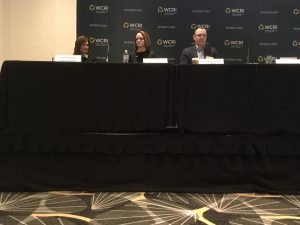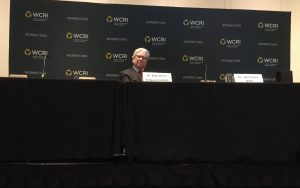How InsureTech is Changing Our Industry
There is an increasing amount of capital flowing into the insurance industry in search of innovative solutions. This session at the 2018 Advisen Casualty Insights Conference highlighted the technological advancements in which the industry is investing and why. Speakers included: Audrey Rampinelli, Senior Risk Executive, Vice President, Risk Management (Moderator) John Heveran, SVP and CIO of Commercial Insurance, Liberty Mutual Insurance Alex Schwarzkopf, CEO, Co-Founder, Pillar Technologies, Inc. Sarah Street, Director of XL Innovate, XL Catlin InsureTech is the term used to describe the various technology solutions impacting the insurance industry. It is based off the idea of taking processes
(Read the full article…)
Preparing to Insure Autonomous Vehicles
Autonomous vehicle technology is moving fast and is considered by many as an impending disruptor to auto, personal and products liability. But how imminent is the change and what will it look like? This session at the 2018 Advisen Casualty Insights Conference explored autonomous vehicle technology and the insurance market’s response. Panelists included: Elizabeth K. Johnson, Head of Excess Casualty, AIG (Moderator) Alan Gier, Director, Global Risk Management & Insurance, General Motors Liz Kramer, Technical Director – Auto, Zurich Michael R. Nelson, Partner, New York, Eversheds Sutherland Autonomous vehicles are projected to have a positive impact on the industry due
(Read the full article…)
Casualty Large Claim Trends
This session at the 2018 Advisen Casualty Insights Conference outlined trends related to mass torts and other large claims impacting the casualty sector. Panelists included: – Jonathon Drummond, Head of Casualty Brokerage, North America, Willis Towers Watson (Moderator) – Josh Gold, Shareholder, New York, Anderson Kill – Phil Goldberg, Director of the Progressive Policy Institute’s Center for Civil Justice and Co-Chair, Shook, Hardy & Bacon L.L.P. – Emily O. Slater, Managing Director, Burford Capital – Megan Watt, Chief Claims Officer, Everest Insurance We are currently in a very-challenged market. A lot of that is being driven by trends that are
(Read the full article…)
Evolving Casualty Challenges: A Buyer’s Perspective
Disruption is quickly becoming a constant in the insurance business today. Autonomous vehicles, wearable devices and the gig economy are just some of the new technologies currently shaping the liability and employment landscape. But what’s next? In this session at the 2018 Advisen Casualty Insights Conference, casualty insurance buyers discussed the evolving challenges to their businesses and industries. Panelists included: David T. Carlson, U.S. Manufacturing & Automotive Industry Practice Leader, Marsh (Moderator) Alan Gier, Director, Global Risk Management & Insurance, General Motors John Kline, Director, Risk & Insurance Management, Discover Financial Services Amy Wagner, Vice President, Global Products, Insurance &
(Read the full article…)
Reinsurers’ View from the Top
Reinsurance capital underpins the casualty marketplace by paying claims and shaping coverage. In the opening session at the 2018 Advisen Casualty Insights Conference, reinsurance executives discussed the factors driving reinsurance appetite in the casualty sector. Panelists included: Joseph Cellura, President, North American Casualty Division, Allied World (Moderator) M. Steven Levy, President and CEO, Reinsurance Division, Munich Reinsurance America, Inc. Keith Wolfe, President U.S. P&C, Swiss Re The North American casualty reinsurance market has experienced growth driven primarily by their clients desire to grow their business. Demand has increased and reinsurers are expanding their appetite into casualty – the most growth
(Read the full article…)
The World of Work is Changing
At the 2018 WCRI Annual Research & Issues Conference a panel discussed how the world of work is changing. The panel included: Judge David Langham, Florida Deputy Chief Judge of Compensation Claims Steven Tolman, President Massachusetts AFL-CIO Denise Zoe Algire, Albertsons Companies Charlie Kingdollar, Gen Re John Ruser, WCRI (moderator) Question: What do you think the impact of automation will be on workers in the workplace? Answers: With less workers available in the workforce in the future, some level of automation is essential to create efficiencies and streamline work. Without automation we will not be able to perform all the
(Read the full article…)
How Marijuana Laws Impact Prescription Drug Spending
At the 2018 WCRI Annual Issues & Research Conference, Dr. David Bradford from the Department of Public Administration and Policy at the University of Georgia discussed the impact state marijuana laws have on prescription drug spending. The question is, what has been the effect of legalizing medical marijuana on the use of FDA approved pain medications? The study author cautioned on the limitations of the data they had available. Their conclusions are inferred from the information rather than having information showing particular patients are shifting from prescription pain medications to medical marijuana. Currently 48 states and DC allow for medical
(Read the full article…)
Findings from WCRI Studies
At the 2018 WCRI Annual Research & Issues Conference a panel presented findings from several different WCRI studies. Please note, some of these findings are preliminary, and therefore, subject to change. Then panel included: Ramona Tanabe, WCRI Evelina Radeva, WCRI Rebecca Yang, WCRI Carol Telles, WCRI Tennessee The WCRI study measured the impact of the 2013 reforms. They study found the average PPD per claim decreased by 24% after the reforms. The law change included limits on PPD benefits and changed the method of calculating these benefits. Prior to these legislative changes PPD costs in Tennessee were higher than the
(Read the full article…)
Impact of Opioids in the Workplace
At the 2018 WCRI Annual Issues & Research Conference, a panel discussed the impact of opioids and prescription drugs on the workplace. The panel included: Dr Bogdan Savych, WCRI Jane Terry, National Safety Council Joan Vincenz, United Airlines WCRI studies have long shown the widespread use of opioids in workers’ compensation. A recent WCRI study focused on the impact these drugs have on duration of disability. The study showed temporary disability duration was 251% higher on claims receiving opioids on a long-term basis. The higher the dosage, the greater the increase in disability. A study from the National Safety Council
(Read the full article…)
Workers’ Compensation 2030
At the WCRI Annual Issues & Research Conference Dr Richard Victor, former CEO of WCRI and currently a senior fellow with Sedgwick Institute, discussed his views of workers’ compensation in the future. The workers’ compensation system was a compromise between labor and business designed to provide no fault benefits in an environment that gave exclusive remedy protections to employers. Over the years there have been ebbs and flows to the system in an effort to maintain balance in the system. There is a constant struggle to balance benefits to workers with the costs of the system paid by employers. In
(Read the full article…)











